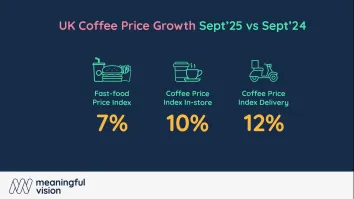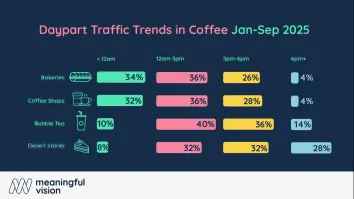
Starbucks to pilot ‘bean to cup' traceability with new technology
It is adding a new ingredient to take “bean to cup” transparency to the next level.
As a continuation of its ethical sourcing commitment, Starbucks will launch a pilot program with select coffee farmers in Costa Rica, Colombia and Rwanda to develop next-level data technology to log and share real-time information along the journey of coffee beans with the aim of driving positive impact to smallholder farmers within its supply chain.
“Over the next two years, we will look to demonstrate how technology and innovative data platforms can give coffee farmers even more financial empowerment,” said Kevin Johnson, chief executive officer at Starbucks. “We’ll leverage an open-source approach to share what we learn with the rest of the world.”
Traceability technology could have profound implications for connecting coffee drinkers to the farmers who grow it, said Arthur Karuletwa, director of traceability at Starbucks. “This could be a seismic change in an industry that hasn’t had much innovation in the way coffee moves across borders and oceans,” he said. “At the same time, I’ve met farmers who have very little by way of possessions, but they have a mobile phone. Digital has become the economic engine of this century, and traceability preserves the most valuable assets we have as human beings – our identity.”
With its technology pilot program in Costa Rica, Rwanda and Colombia, Starbucks hopes to develop and demonstrate over the next two years how technology and innovative data platforms can give coffee farmers even more financial independence and confidence. Conservation International will measure the impact of traceability to understand the benefits farmers will receive from this technology.
Starbucks has already invested more than $100 million to support coffee communities, improve farmer livelihoods, and ensure a long-term supply of high-quality coffee, including as part of Coffee and Farmer Equity (C.A.F.E.) practices as well as farmer support centers, farmer loans and a commitment to provide 100 million healthy, disease-resistant coffee trees to farmers most impacted by climate change.
Ambassador Bill Kayonga, chief executive officer of Rwanda's National Agricultural Export Development Board (NAEB), said the traceability pilot is right in line with the vision of the Rwandan coffee sector. “Traceability builds value for farmers and is transforming the coffee sector in Rwanda, which in turn strengthens the country as a whole,” Kayonga said.
Ronald Peters, executive director of the Costa Rican Coffee Institute (ICAFE), said supply chain transparency and fair wages for coffee farmers have always been important in Costa Rica, and that “working with Starbucks is like working with a friend” on the path to reach the ultimate goal in a world of coffee traceability and sustainability.
“For many years, Costa Rica has had a great relationship with Starbucks. We share the same values and goals in looking to improve the livelihoods of our coffee sector by ensuring the source of our amazing coffee with a sense of sustainability,” Peters said. “Many years ago, our controls and transactions were all done by paper, and today we are even talking about blockchain technology. This shows us that, more than being at the front of every technological advancement, having the information and being flexible and adaptable are important.”
Juan Esteban Orduz, president of the Colombian Coffee Growers Federation in North America, said he’s looking forward to what’s ahead. “The Colombian Coffee Growers Federation and Starbucks share the same vision to support coffee farmers and ensure they have the tools needed to be successful. Projects like these are going to make traceability a reality. We look forward to the results of the pilot and seeing how farmers in Colombia can benefit.”

























